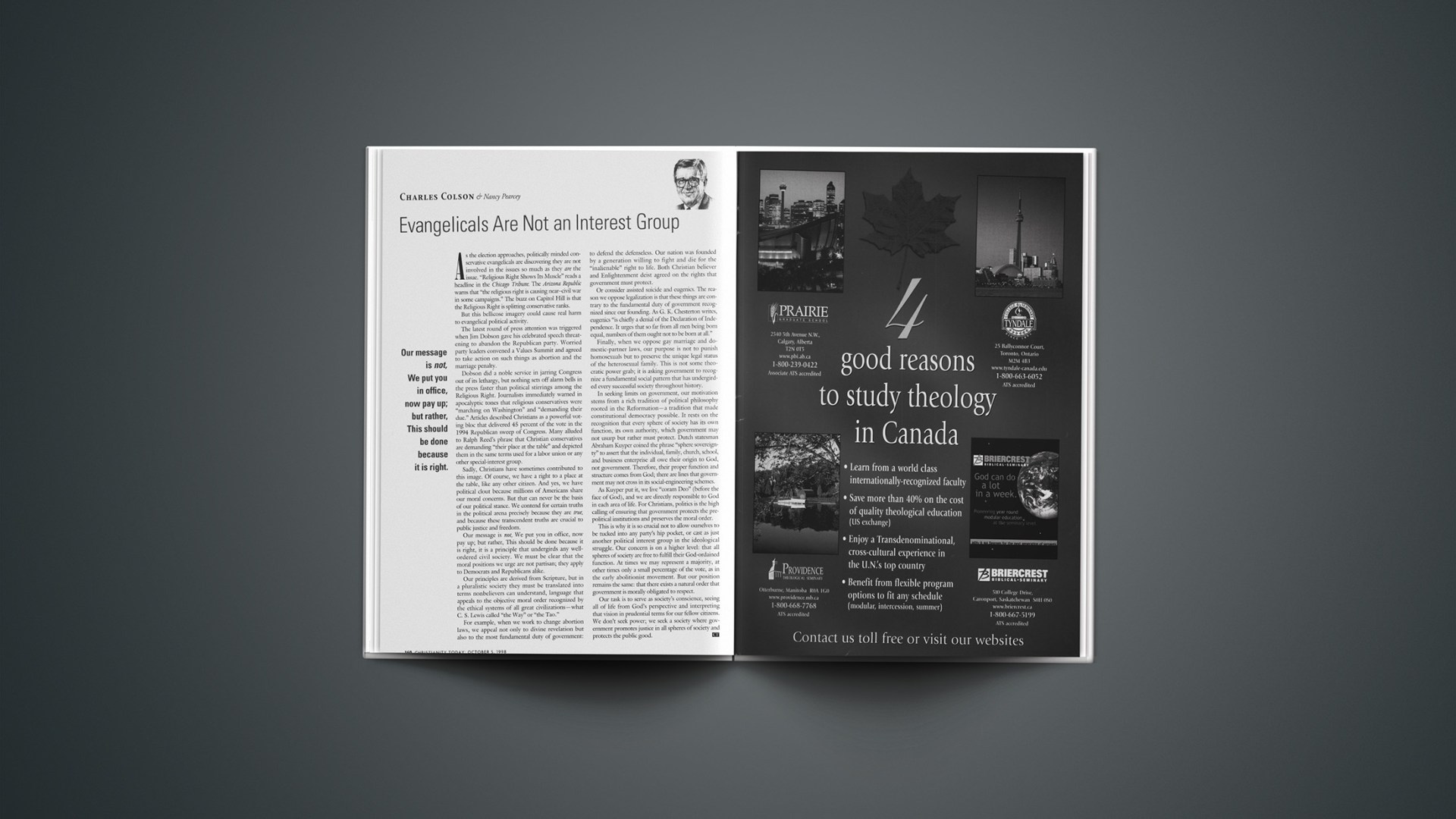As the election approaches, politically minded conservative evangelicals are discovering they are not involved in the issues so much as they are the issue. “Religious Right Shows Its Muscle” reads a headline in the Chicago Tribune. The Arizona Republic warns that “the religious right is causing near-civil war in some campaigns.” The buzz on Capitol Hill is that the Religious Right is splitting conservative ranks.
But this bellicose imagery could cause real harm to evangelical political activity.
The latest round of press attention was triggered when Jim Dobson gave his celebrated speech threatening to abandon the Republican party. Worried party leaders convened a Values Summit and agreed to take action on such things as abortion and the marriage penalty.
Dobson did a noble service in jarring Congress out of its lethargy, but nothing sets off alarm bells in the press faster than political stirrings among the Religious Right. Journalists immediately warned in apocalyptic tones that religious conservatives were “marching on Washington” and “demanding their due.” Articles described Christians as a powerful voting bloc that delivered 45 percent of the vote in the 1994 Republican sweep of Congress. Many alluded to Ralph Reed’s phrase that Christian conservatives are demanding “their place at the table” and depicted them in the same terms used for a labor union or any other special-interest group.
Sadly, Christians have sometimes contributed to this image. Of course, we have a right to a place at the table, like any other citizen. And yes, we have political clout because millions of Americans share our moral concerns. But that can never be the basis of our political stance. We contend for certain truths in the political arena precisely because they are true, and because these transcendent truths are crucial to public justice and freedom.
Our message is not, We put you in office, now pay up; but rather, This should be done because it is right, it is a principle that undergirds any well-ordered civil society. We must be clear that the moral positions we urge are not partisan; they apply to Democrats and Republicans alike.
Our principles are derived from Scripture, but in a pluralistic society they must be translated into terms nonbelievers can understand, language that appeals to the objective moral order recognized by the ethical systems of all great civilizations—what C. S. Lewis called “the Way” or “the Tao.”
For example, when we work to change abortion laws, we appeal not only to divine revelation but also to the most fundamental duty of government: to defend the defenseless. Our nation was founded by a generation willing to fight and die for the “inalienable” right to life. Both Christian believer and Enlightenment deist agreed on the rights that government must protect.
Or consider assisted suicide and eugenics. The reason we oppose legalization is that these things are contrary to the fundamental duty of government recognized since our founding. As G. K. Chesterton writes, eugenics “is chiefly a denial of the Declaration of Independence. It urges that so far from all men being born equal, numbers of them ought not to be born at all.”
Finally, when we oppose gay marriage and domestic-partner laws, our purpose is not to punish homosexuals but to preserve the unique legal status of the heterosexual family. This is not some theocratic power grab; it is asking government to recognize a fundamental social pattern that has undergirded every successful society throughout history.
In seeking limits on government, our motivation stems from a rich tradition of political philosophy rooted in the Reformation—a tradition that made constitutional democracy possible. It rests on the recognition that every sphere of society has its own function, its own authority, which government may not usurp but rather must protect. Dutch statesman Abraham Kuyper coined the phrase “sphere sovereignty” to assert that the individual, family, church, school, and business enterprise all owe their origin to God, not government. Therefore, their proper function and structure comes from God; there are lines that government may not cross in its social-engineering schemes.
As Kuyper put it, we live “coram Deo” (before the face of God), and we are directly responsible to God in each area of life. For Christians, politics is the high calling of ensuring that government protects the prepolitical institutions and preserves the moral order.
This is why it is so crucial not to allow ourselves to be tucked into any party’s hip pocket, or cast as just another political interest group in the ideological struggle. Our concern is on a higher level: that all spheres of society are free to fulfill their God-ordained function. At times we may represent a majority, at other times only a small percentage of the vote, as in the early abolitionist movement. But our position remains the same: that there exists a natural order that government is morally obligated to respect.
Our task is to serve as society’s conscience, seeing all of life from God’s perspective and interpreting that vision in prudential terms for our fellow citizens. We don’t seek power; we seek a society where government promotes justice in all spheres of society and protects the public good.
Copyright © 1998 Christianity Today. Click for reprint information.










